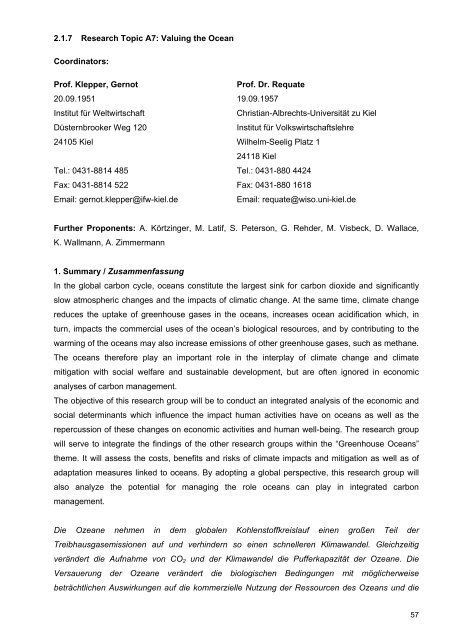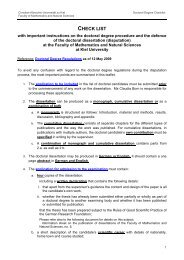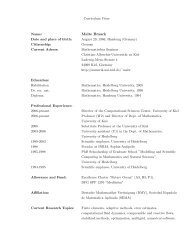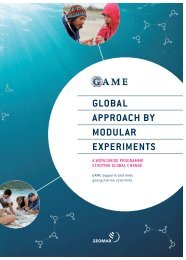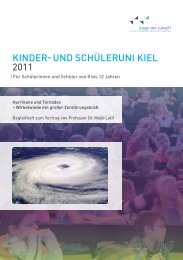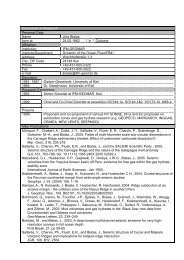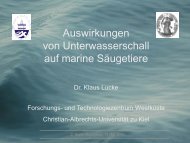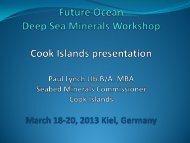- Page 7 and 8:
Contents1 General Information about
- Page 9 and 10:
1 General Information about the Clu
- Page 11 and 12:
1.2 Research Program1.2.1 Summary/Z
- Page 13 and 14: 1.2.2.2 ObjectivesThe Future Ocean
- Page 15 and 16: will address the emerging new resea
- Page 17 and 18: Topics Objectives DisciplinesA1 Exa
- Page 19 and 20: development of these new initiative
- Page 21 and 22: Project Objective IndustryPartnersO
- Page 23 and 24: Continued excellence in the field o
- Page 25 and 26: The establishment of several new po
- Page 27 and 28: 1.4.1 Integrated School of Ocean Sc
- Page 29 and 30: ensure that emerging innovations wi
- Page 31 and 32: Institute / DisciplineAcademic Leve
- Page 33 and 34: their orientation according to the
- Page 35 and 36: 1.7.2 Structural Evolution and Qual
- Page 37 and 38: 30- Notes -
- Page 39 and 40: organisms to elevated CO 2 and decr
- Page 41 and 42: ist wahrscheinlich stärker als wä
- Page 43 and 44: out by the proponents and will esta
- Page 45 and 46: Rückkopplungsschleife weitere Erw
- Page 47 and 48: enthic biota of gas release or the
- Page 49 and 50: Synthese, aufbauend auf einer Kombi
- Page 51 and 52: (4) a determination of the impact o
- Page 53 and 54: Einflüsse. Um deren Auswirkungen b
- Page 55 and 56: on longer time scales. The latter t
- Page 57 and 58: werden kann. Allerdings sind die ch
- Page 59 and 60: the expertise which already exists
- Page 61 and 62: 2. State-of-the-artThe changing com
- Page 63: • Field and laboratory investigat
- Page 67 and 68: Valuing the Ocean: Research focus a
- Page 69 and 70: submarine earthquakes, slumps and s
- Page 71 and 72: Fischerei ist eine der wichtigsten
- Page 73 and 74: ecosystems. In particular, the foll
- Page 75 and 76: Hochdurchsatztechnologien die Evolu
- Page 77 and 78: microbial diversity on their barrie
- Page 79 and 80: transient three-dimensional fluid f
- Page 81 and 82: modeling, which describe chemical a
- Page 83 and 84: Erdbeben, submarine Hangrutschungen
- Page 85 and 86: Simons 2003) to investigate shallow
- Page 87 and 88: damit zusammenhängender Meeresspie
- Page 89 and 90: B5(1) Sea-Level Rise and Physical-M
- Page 91 and 92: Pickrill RA, Todd BJ (2003) The mul
- Page 93 and 94: Onate E, Piazzese J (2005) Decision
- Page 95 and 96: echtlichen und ökonomischen Rahmen
- Page 97 and 98: marine resources, such as energy ex
- Page 99 and 100: 92- Notes -
- Page 101 and 102: 2. State-of-the-artThe variety of n
- Page 103 and 104: and will benefit from expertise in
- Page 105 and 106: Die Plattform 2 stellt die analytis
- Page 107 and 108: 4. New Cluster TechnologiesIn order
- Page 109 and 110: (iv) Proteomanalysetechniken und (v
- Page 111 and 112: 4. New Cluster TechnologiesA specia
- Page 113 and 114: Illustration of existing/emerging a
- Page 115 and 116:
physical parameters (e.g. lowered a
- Page 117 and 118:
etabliert, das insbesondere auf wis
- Page 119 and 120:
2.4.3.2 Central Funds for Transfer
- Page 121 and 122:
International School of Ocean Scien
- Page 123 and 124:
Description Year of purchase Amount
- Page 125 and 126:
3.2 Auxiliary Support3.2.1 Total Fu
- Page 127 and 128:
120- Notes -
- Page 129 and 130:
Suess E, Torres ME, Bohrmann G, Col
- Page 131 and 132:
Schreiber, StefanVisbeck, MartinSri
- Page 133 and 134:
4.3 Third-Party FundingNo. FundingB
- Page 135 and 136:
Leibniz Institute of Marine Science
- Page 137 and 138:
These JRG’s will augment the expe
- Page 139 and 140:
The Cluster is embedded in the “K
- Page 141 and 142:
A14- Notes -
- Page 143 and 144:
4.6 Curricula Vitae and Lists of Pu
- Page 145 and 146:
Curriculum of ResearchPersonal Data
- Page 147 and 148:
Curriculum of ResearchPersonal Data
- Page 149 and 150:
Curriculum of ResearchPersonal Data
- Page 151 and 152:
Curriculum of ResearchPersonal Data
- Page 153 and 154:
Curriculum of ResearchPersonal Data
- Page 155 and 156:
Curriculum of ResearchPersonal Data
- Page 157 and 158:
Curriculum of ResearchPersonal Data
- Page 159 and 160:
Curriculum of ResearchPersonal Data
- Page 161 and 162:
Curriculum of ResearchPersonal Data
- Page 163 and 164:
Curriculum of ResearchPersonal Data
- Page 165 and 166:
Curriculum of ResearchPersonal Data
- Page 167 and 168:
Curriculum of ResearchPersonal Data
- Page 169 and 170:
Curriculum of ResearchPersonal Data
- Page 171 and 172:
Curriculum of ResearchPersonal Data
- Page 173 and 174:
Curriculum of ResearchPersonal Data
- Page 175 and 176:
Curriculum of ResearchPersonal Data
- Page 177 and 178:
Curriculum of ResearchPersonal Data
- Page 179 and 180:
Curriculum of ResearchPersonal Data
- Page 181 and 182:
Curriculum of ResearchPersonal Data
- Page 183 and 184:
Curriculum of ResearchPersonal Data
- Page 185 and 186:
Curriculum of ResearchPersonal Data
- Page 187 and 188:
Curriculum of ResearchPersonal Data
- Page 189 and 190:
Curriculum of ResearchPersonal Data
- Page 191 and 192:
Curriculum of ResearchPersonal Data
- Page 193 and 194:
Curriculum of ResearchPersonal Data
- Page 195 and 196:
Curriculum of ResearchPersonal Data
- Page 197 and 198:
Curriculum of ResearchPersonal Data
- Page 199 and 200:
Curriculum of ResearchPersonal Data
- Page 201 and 202:
Curriculum of ResearchPersonal Data
- Page 203 and 204:
Curriculum of ResearchPersonal Data
- Page 205 and 206:
Curriculum of ResearchPersonal Data
- Page 207 and 208:
Curriculum of ResearchPersonal Data
- Page 209 and 210:
A82- Notes -
- Page 211 and 212:
DEKLIMGerman Climate Research Progr
- Page 213 and 214:
ITQ’sISAISOSJRGKCMSKitzLALIFLIMSL
- Page 215 and 216:
WTOWTSHXAFSXRDZMBWorld Trade Organi
- Page 218:
Prof. Dr. Boris Culik • Maritimes
- Page 230:
GMT-Geschäf*sstelleWe"*w{eltJ"*n $
- Page 236:
f,rylheonRaytheon Anschütz GmbHPos


